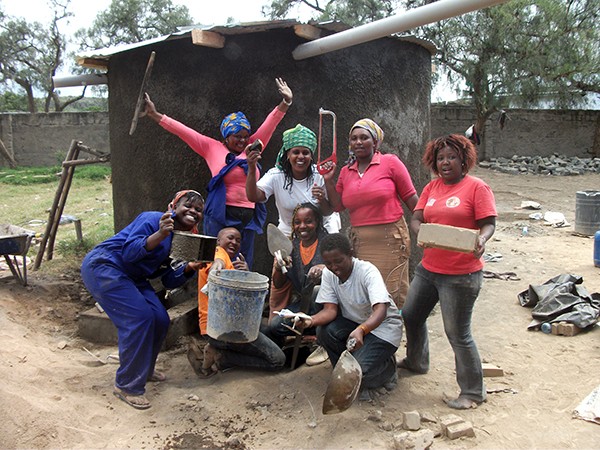By Gemma Bulos

“Can you train my wife to do what you do?” is a question Grace Mushongi often hears from local men when she builds rainwater harvesting systems and tanks in villages around Bukoba, Tanzania. Her husband likes to brag about her skills, especially to other masons. He recommends they seek help from his wife because, after all, she is a mason, too.
If you had met Grace two and half years ago, she would not have been able to tell you how to mix cement, explain the elements of a rainwater harvesting system, or even identify a basic trowel. But since participating in a water, sanitation, and hygiene (WASH) leadership training program, Grace has developed and built systems that provide water to more than 2,000 people. These efforts have had a disproportionate impact on women, who previously had to walk as long as eight hours a day to fetch unsafe water from the river.
Other women around the world have similar stories of training transforming them into entrepreneurs and community leaders. By learning skills from masonry to medicine, women are not only able to improve their own lives but also bring entire communities out of poverty.
Prior to receiving WASH training in Kenya, Catherine Wanjohi’s only experience with water was using it for her domestic chores. But now she serves as chair of a local water board where she works to increase women’s participation in community water activities. She also works as a counselor and vocational trainer who counsels sex workers to pursue alternative livelihoods and to become community leaders through her organization, Life Bloom Services International.
Phionah Mbugua is one of the women Catherine touched. Phionah left her life as a commercial sex worker after receiving training in masonry. She now makes an income by working to improve her community’s WASH infrastructure and training other sex workers to follow in her footsteps.
The United Nations Food and Agricultural Organization recognizes that the “exclusion of women from the planning of water supply and sanitation schemes is a major cause of their high rate of failure.” Nevertheless, the voices of women often go unheard. When this happens, entire communities pay the price.
USAID took an important step to ensure that women’s voices are taken into account with the release of its Water and Development Strategy this year. The Strategy seeks to ensure that women are empowered to effectively advocate for their perspectives and priorities, and that they are able to fully engage as managers, partners, and entrepreneurs in water-related activities and enterprises. This is a promising start, but much work still needs to be done. It is now up to us, the development community, to put these ideas into practice and to go to villages around the world and listen to women’s voices.
Women around the world are a massive source of untapped potential, especially in the water sector. By supporting local women with skills in construction, advocacy, entrepreneurship, and leadership, we as a community have an opportunity to institutionalize WASH practices that can be passed on from generation to generation. Hundreds–sometimes thousands–of people benefit from every woman trained to transform her life and give back to her community. The ripple effect is real.
Gemma Bulos is a multi-award winning social entrepreneur recognized for her work designing community-driven WASH solutions. She serves as the director of the Global Women’s Water Initiative (GWWI), which trains women in the developing world on sustainable WASH solutions and supports female leadership in the water sector. Follow them on Twitter: @womenwater (GWWI) and @gemmabelle(Gemma Bulos).







Comment
Make a general inquiry or suggest an improvement.